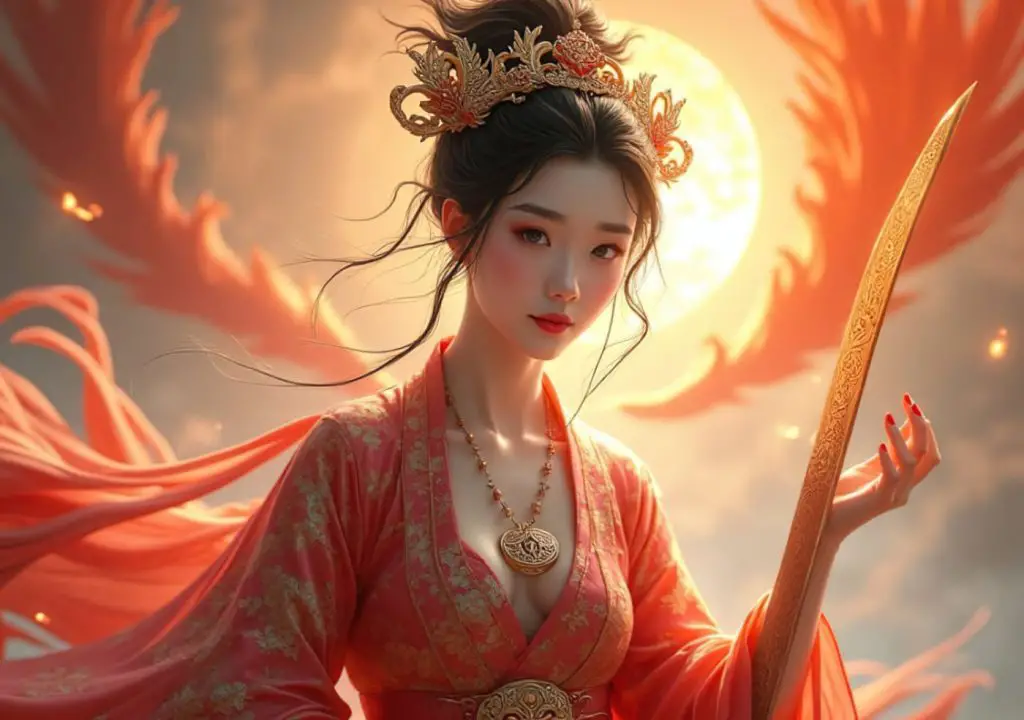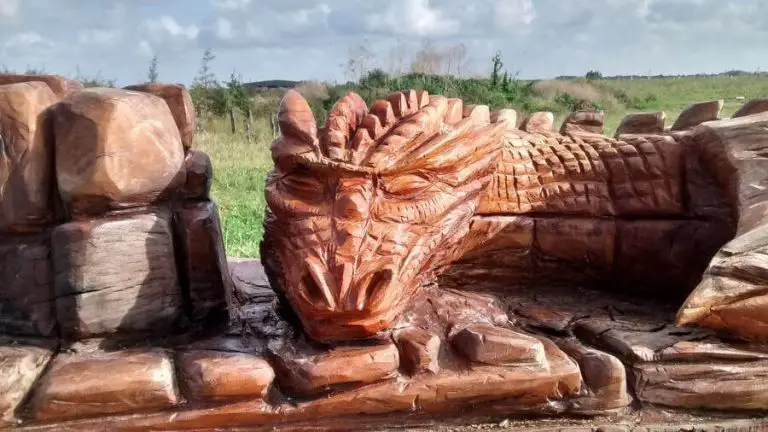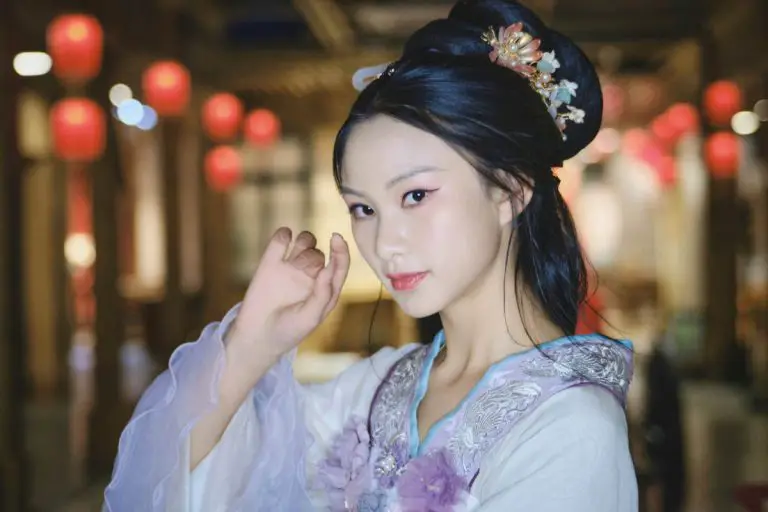Jiutian Xuannu (九天玄女), also known as the “Mysterious Lady of the Nine Heavens,” is a revered goddess in Chinese mythology. She is a multifaceted deity who is primarily associated with warfare, wisdom, and esoteric knowledge.
Her role as a divine strategist and protector has made her one of the most important female figures in Chinese religious tradition, particularly within Taoism. Jiutian Xuannu is often seen as both a warrior goddess and a teacher of sacred wisdom, guiding emperors and leaders in times of need.
The name “Jiutian Xuannu” carries deep symbolism. “Jiutian” (九天) translates to “Nine Heavens,” which is a significant concept in ancient Chinese cosmology, representing the highest celestial realms.
The number nine is traditionally associated with completeness and ultimate power. “Xuannu” (玄女), often translated as “Mysterious Lady” or “Dark Lady,” suggests a goddess who holds secret knowledge and profound mysteries. Together, her name highlights her divine authority and her connection to both heaven and the hidden forces of the universe.
In Chinese mythology, Jiutian Xuannu holds a unique place as both a warrior and a healer. She is famously known for descending from the Nine Heavens to assist the legendary Yellow Emperor (Huangdi) during his battle against the formidable warlord Chi You.
Beyond her martial expertise, she also embodies the balance between physical strength and spiritual wisdom. Jiutian Xuannu is believed to have imparted critical knowledge, from military tactics to the secrets of longevity and sexuality, making her an essential figure in both martial and mystical practices.
In the following sections, we will delve deeper into the life and legends of Jiutian Xuannu, exploring her historical context, mythological background, cultural significance, and enduring legacy.
Historical Context of Jiutian Xuannu
Jiutian Xuannu, originally known simply as Xuannü, has roots that stretch back to the early periods of Chinese civilization. Initially recognized as a goddess of war and sexuality, her character emerged long before the formal establishment of Taoism. The earliest references to her can be traced to texts from the 9th century, where she is depicted as a teacher to the Yellow Emperor, Huangdi. This association with a foundational figure in Chinese history solidified her importance in the mythological landscape.
As a goddess who embodies both martial prowess and esoteric wisdom, Jiutian Xuannu’s role in ancient Chinese culture reflects a society deeply influenced by a blend of shamanistic and early Taoist beliefs. These traditions often emphasized the interconnectedness of the spiritual and physical realms, with gods and goddesses like Jiutian Xuannu serving as bridges between humans and the heavens.
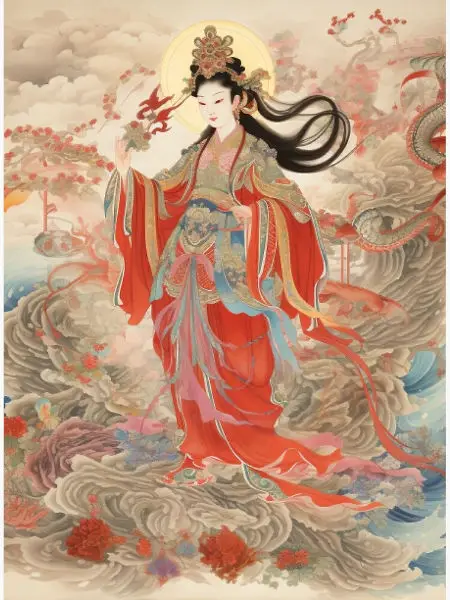
Symbolism of the “Nine Heavens” in her title
The “Nine Heavens” in Jiutian Xuannu’s title is rich with symbolism. In ancient Chinese cosmology, the universe was divided into multiple layers, with the Nine Heavens representing the highest and most divine levels of existence. These realms were thought to be the domain of the most powerful deities, far above the earthly world.
By being associated with the Nine Heavens, Jiutian Xuannu is depicted as a deity of supreme authority, one who governs over vast celestial regions. The number nine itself is significant in Chinese culture, symbolizing completeness and ultimate power, making Jiutian Xuannu a figure who embodies the full spectrum of divine wisdom and strength.
Evolution of her worship through different dynasties
Jiutian Xuannu’s prominence grew and evolved over the course of Chinese history, especially during times of war and political upheaval. In early dynasties like the Shang and Zhou, she was seen as a powerful protector and military advisor, revered by both warriors and rulers who sought her guidance.
During the Han Dynasty, her prominence began to wane due to cultural shifts that favored more subdued representations of femininity and divinity. However, by the Tang Dynasty, she experienced a resurgence as Taoism gained popularity. This period saw a reimagining of her character; she was increasingly depicted as a high goddess who employed magical and intellectual means to achieve victory rather than relying solely on brute force.
The Tang Dynasty also marked attempts by scholars like Du Guangting to refine Jiutian Xuannu’s image by removing more controversial aspects related to her sexuality. Despite these efforts, her dual nature as both a warrior goddess and a figure associated with sexual empowerment remained integral to her identity.
By the Ming Dynasty, she was invoked not just for military success but also for political maneuvering, illustrating her adaptability across different societal contexts.
Related reading: Nüwa: The Mother Goddess of Chinese Mythology – Opens in new tab
Influence of Taoism on her mythology
Taoism played a significant role in shaping Jiutian Xuannu’s mythology, especially as the religion evolved. Taoist teachings, which emphasize harmony with the cosmos, immortality, and the pursuit of spiritual enlightenment, aligned naturally with her attributes.
Taoist texts often highlight Jiutian Xuannu as a master of both physical and metaphysical realms. She is revered not only as a goddess of war but also as a teacher of Taoist alchemy, sexual practices for health and longevity, and cosmic wisdom.
One of the most notable influences of Taoism on her mythology is her association with martial arts and military strategy. Taoist practitioners saw her as a guide in the art of war, blending tactical knowledge with spiritual insight. Additionally, Taoist alchemists revered Jiutian Xuannu as a goddess who revealed the secrets of immortality, making her an important figure in their quests for enlightenment and physical longevity.
Her influence on Taoism also elevated her status as a feminine power figure. Unlike many warrior deities, who were typically male, Jiutian Xuannu stood out as a symbol of both strength and nurturing wisdom, reflecting Taoism’s embrace of balance between yin and yang—female and male forces in the universe.
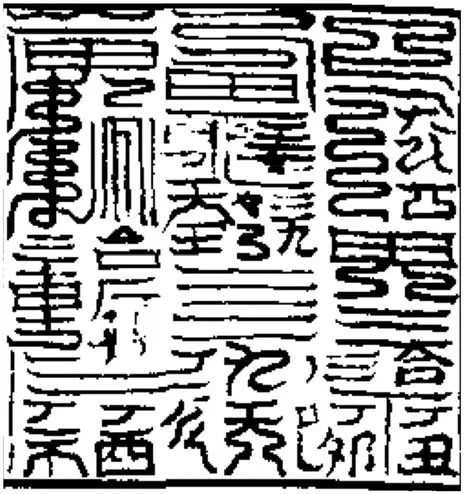
Jiutian Xuannu’s Role as a Divine Strategist
Jiutian Xuannu is most famously known as a divine strategist, a role that sets her apart from many other deities in Chinese mythology. Her wisdom and tactical genius were highly sought after by rulers, especially during times of war. Unlike many warrior gods who simply embody brute strength, Jiutian Xuannu is depicted as a master of both military strategy and spiritual insight.
Her guidance was seen as essential in achieving victory, not through sheer force, but through careful planning, knowledge of the enemy, and the manipulation of cosmic forces to influence outcomes. This made her a revered figure among those seeking not only power but also understanding of the deeper workings of the universe.
Assistance to the Yellow Emperor During Battles
One of the most significant episodes in Jiutian Xuannu’s mythology involves her assistance to the Yellow Emperor, Huangdi, during his legendary battles against the formidable Chi You. As the story goes, when Huangdi found himself trapped in a thick mist conjured by Chi You, he called upon Jiutian Xuannu for help.
She appeared riding a phoenix, wielding clouds as reins, and imparted crucial knowledge and artifacts that enabled him to defeat his enemy. These gifts included magical texts and amulets that not only aided in battle but also solidified Huangdi’s authority over China, ultimately leading him to immortality.
This pivotal moment in Chinese mythology highlights Jiutian Xuannu’s role as more than just a warrior goddess. She was the embodiment of strategic foresight, showing that wisdom and divine knowledge were just as crucial in battle as physical strength.
Related reading: Guanyin: The Goddess Who Listens to the Cries of the World – Opens in new tab
Jiutian Xuannu’s Symbolism and Attributes
Jiutian Xuannu embodies a unique blend of attributes that symbolize war, longevity, and sexuality. As a war goddess, she is often depicted wielding weapons and commanding armies; however, her influence extends beyond the battlefield. She is also associated with longevity through her teachings on health and wellness, particularly within the framework of Traditional Chinese Medicine.
Her connection to sexuality is particularly significant. In ancient texts, including the Xuannü Jing (玄女经), she is depicted as a guide to sexual cultivation, teaching that sexual energy is a powerful force that, when properly harnessed, can lead to spiritual enlightenment and physical well-being. This aspect of her character adds depth to her persona, as she bridges the gap between physical vitality and spiritual mastery.
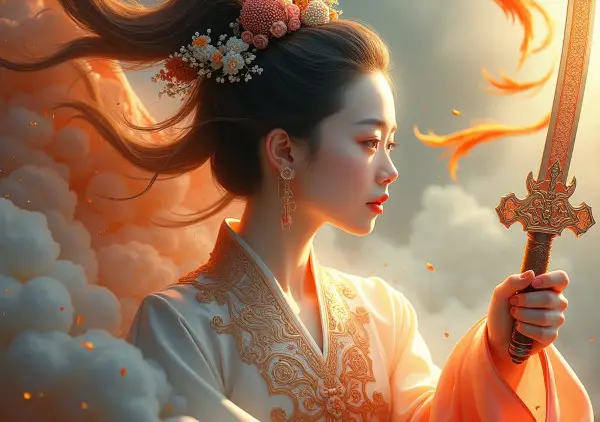
Description of her physical appearance and attire
Jiutian Xuannu is often depicted as an ethereal and regal figure, reflecting her status as a goddess of the highest celestial order. In traditional artwork, she is shown wearing flowing robes adorned with celestial patterns, symbolizing her connection to the heavens.
Her attire is usually intricate, with motifs of stars, clouds, or dragons, representing her control over cosmic forces. She is sometimes shown holding a sword or a divine artifact, such as a compass or a fan, tools that represent her mastery of both the physical and metaphysical aspects of battle.
Her physical appearance is striking—she is portrayed as a youthful yet authoritative figure, embodying both grace and power. Some depictions show her with a headdress made of phoenix feathers, a symbol of immortality and transformation, further emphasizing her role as a guide to eternal life.
Her eyes are often described as piercing, symbolizing her ability to see through illusions and into the heart of matters, a fitting trait for a goddess known for her wisdom and strategic brilliance.
Jiutian Xuannu in Traditional Chinese Medicine
Jiutian Xuannu plays a significant role in Traditional Chinese Medicine (TCM), where she is revered not only as a goddess of war but also as a symbol of health and longevity. Her teachings emphasize the connection between the cosmos and the human body, illustrating how divine forces can influence physical well-being.
Connection to Healing Practices and Longevity
In several ancient texts, Jiutian Xuannu is associated with the concept of longevity through her influence on the circulation of breath, which is vital for nourishing the spirit. For instance, the Huangting Jing describes practices where adepts are instructed to channel their breath into Jiutian Xuannu, thereby enhancing their vitality and extending their lives.
This connection underscores her role as a guardian of life, where her teachings are seen as pathways to achieving both physical and spiritual health.
Influence on Concepts of Health and Wellness
Jiutian Xuannu’s influence extends into various health practices that are foundational to TCM. Her teachings on inner alchemy (neidan 内丹) —a practice aimed at cultivating life energy (Qi 气)—are particularly significant.
These practices often involve meditation, breath control, and dietary guidelines that align with her philosophies. The integration of her wisdom into TCM has shaped modern wellness concepts, including practices like Qigong, which focus on harmonizing body and spirit for overall health.
Moreover, her association with sexuality as a means of achieving balance and vitality has led to the incorporation of sexual health practices within TCM frameworks. Texts such as the Xuannü Jing outline techniques that emphasize the importance of sexual energy (jing 精) in maintaining health and longevity, reflecting Jiutian Xuannu’s multifaceted role in both martial and healing traditions.
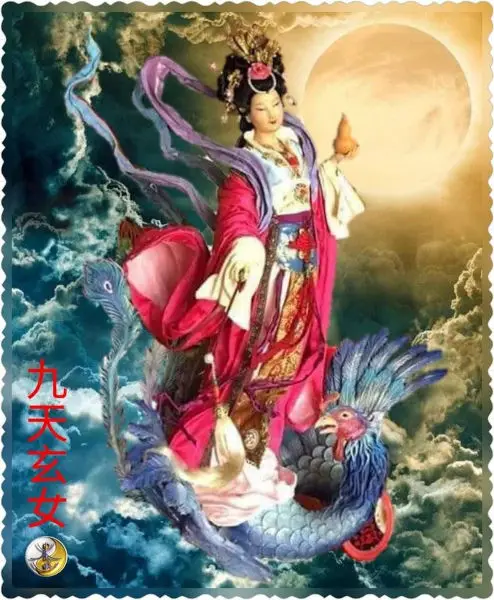
Representation in Art and Literature
Jiutian Xuannu’s presence in art and literature is both rich and multifaceted, reflecting her significance in Chinese culture. From classical texts to modern interpretations, her character has inspired countless artistic expressions that explore her roles as a goddess of war, sexuality, and longevity.
Depictions in classical texts and modern interpretations
Jiutian Xuannu has been a prominent figure in classical Chinese literature, where her image as a divine strategist and a teacher of esoteric knowledge is vividly portrayed.
One of the earliest mentions of Jiutian Xuannu appears in the Huangdi Neijing (Yellow Emperor’s Inner Canon), a foundational text of Traditional Chinese Medicine. Here, she is depicted as a celestial being who imparts knowledge of health, sexual cultivation, and longevity to the Yellow Emperor. Her role in guiding the emperor during the battle against Chi You is also recounted in historical and mythological texts, emphasizing her tactical brilliance and divine wisdom.
In Taoist writings, such as the Xuannü Jing (玄女经), she takes on an even more mystical role. These texts describe her as a goddess who reveals the secrets of immortality and the sacred arts of Taoist alchemy.
Her teachings on the harmonization of yin and yang energies, especially through sexual practices, are treated as divine wisdom meant to be studied and revered. These classical depictions establish Jiutian Xuannu as both a practical guide for rulers and a symbol of higher cosmic knowledge.
Modern interpretations of Jiutian Xuannu continue to explore her multifaceted nature. In contemporary Chinese literature and scholarly work, she is often re-examined through the lens of feminine power, spirituality, and sexuality.
Some reinterpretations emphasize her as a figure of empowerment for women, highlighting her dual roles as both a warrior and a guardian of feminine knowledge. These modern takes often portray her as a figure of balance, embodying both the strength of a warrior and the nurturing wisdom of a healer.
Check out our “Free Chinese Literature Library”. We have compiled some great free resources, about Chinese literature, for your research.
Influence on poetry, paintings, and popular culture
Jiutian Xuannu’s influence extends deeply into Chinese poetry and painting. During the Tang Dynasty, poetry flourished alongside visual arts, leading to a symbiotic relationship between the two. Renowned poets often wrote verses that accompanied paintings of Jiutian Xuannu, enhancing the viewer’s understanding of the artwork’s emotional depth.
This interplay allowed for a richer appreciation of both mediums, as artists sought to capture her divine essence through imagery and verse.
In popular culture, Jiutian Xuannu continues to inspire adaptations across various platforms. She appears in films, television series, and literature that explore themes of heroism and femininity. Her character is often reimagined in narratives that emphasize her strategic brilliance and mystical qualities, appealing to contemporary audiences while retaining her mythological roots.
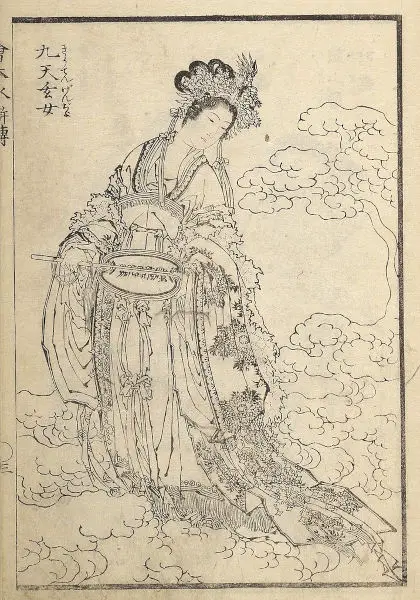
Controversies Surrounding Jiutian Xuannu’s Persona
Throughout Chinese history, Jiutian Xuannu’s dual roles as a warrior goddess and a figure of sexuality sparked debates and, at times, led to attempts to sanitize her image. Particularly during periods of Confucian dominance, where strict social norms regarding morality and sexuality were enforced, her more sensual and sexual aspects were downplayed or even suppressed.
The Han dynasty (206 BCE–220 CE), with its strong Confucian influence, saw the elevation of virtues like chastity and modesty, especially for women. During this era, Jiutian Xuannu’s role as a guide to sexual practices became less emphasized, with greater focus placed on her abilities as a military strategist and a goddess of wisdom. Her connection to sexuality, especially teachings related to sexual cultivation for longevity, was seen as potentially destabilizing to the conservative moral values of the time.
Similarly, during the Song dynasty (960–1279 CE), another period marked by the rise of Neo-Confucianism, attempts were made to align Jiutian Xuannu’s persona with more socially acceptable virtues. Confucian scholars often promoted the idea of a moral and orderly society, where sexual expression was tightly regulated, particularly for women. As a result, her role as a teacher of sexuality was diminished, with texts emphasizing her martial prowess and celestial wisdom instead.
In later dynasties, such as the Ming (1368–1644) and Qing (1644–1912), these efforts continued. Jiutian Xuannu was often portrayed in ways that deemphasized her association with sexuality, focusing instead on her role in divine strategy and longevity practices. Despite this, her teachings persisted in more esoteric Taoist texts and practices, where she remained a revered figure in the realms of sexual cultivation and internal alchemy.
Read also: What are the Four Evil Creatures of Chinese Mythology? – Opens in new tab
Modern Jiutian Xuannu Worship and Temples
While there is no single national festival dedicated to Jiutian Xuannu, modern practitioners of Taoism and those who honor Jiutian Xuannu engage in various rituals that reflect her dual nature as a goddess of war and sexuality.
Devotees may participate in ceremonies that include offerings of incense, fruits, and symbolic items meant to invoke her blessings. Meditation practices often incorporate her teachings on inner alchemy, focusing on the cultivation of qi (life energy) and jing (sexual energy) to promote health and longevity.
Additionally, many followers study sacred texts associated with Jiutian Xuannu, such as the Book of Salvation (九天玄女救世真經) and the Sutra of the Lady of the Nine Heavens for Healing the Heart and Eradicating Evil (九天玄女治心消孽真經). These texts provide insights into her powers and rituals that practitioners can use in their daily lives.

Temples Dedicated to Jiutian Xuannu Across the Country
While Jiutian Xuannu may not have the large-scale, highly popular temples that some of China’s most famous deities enjoy, there are several important sites dedicated to her worship across China.
One notable temple dedicated to her is the Jiutian Xuannu Temple located in Taiwan, where her worship is intertwined with local Taoist traditions. This temple attracts a small yet devoted group of worshippers who believe in her power to influence both personal and cosmic harmony.
In mainland China, particularly in regions with a strong Taoist presence, there are smaller shrines and temples dedicated to her, often located in more rural or historically significant areas. These places of worship may not be widely visited, but they are important cultural and religious sites for those who follow her teachings. In some Taoist temples, she is honored alongside other deities, reflecting her status as part of the broader Taoist pantheon.
Related reading: The Eight Immortals in Chinese Mythology – Opens in new tab
Jiutian Xuannu’s Place Among Other Deities in The Taoist Pantheon
Within the Taoist pantheon, Jiutian Xuannu stands out as a unique figure who embodies the feminine aspect of divinity. She is often depicted alongside other prominent deities, such as Xi Wangmu (Queen Mother of the West) and Laozi, highlighting her importance in the broader context of Taoist beliefs. While many male deities represent strength and authority, Jiutian Xuannu’s character emphasizes intelligence, cunning, and magical prowess—qualities that resonate with the yin aspect of the yin-yang duality.
Her association with the Six Ding Jade Maidens, who serve as her acolytes, further establishes her role as a leader among divine beings. These maidens embody various protective qualities and assist Jiutian Xuannu in carrying out her will on Earth, reinforcing her status as a powerful protector against evil forces.
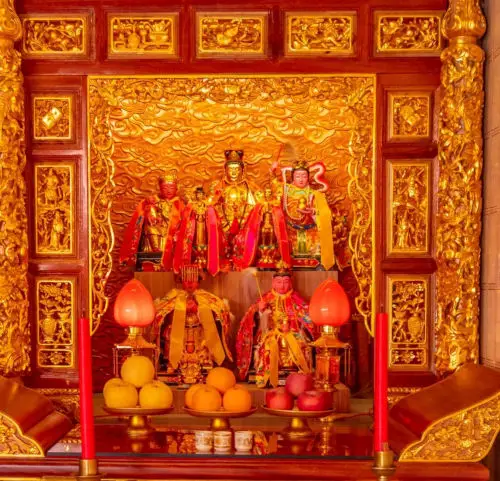
Similarities and Differences Between Jiutian Xuannu and Other Goddesses Worldwide
Jiutian Xuannu, the Mysterious Lady of the Nine Heavens, is a unique figure in Chinese mythology, embodying attributes of war, sexuality, and wisdom. While she shares similarities with various goddesses from different cultures, her distinct characteristics set her apart. Here’s a closer look at the parallels and divergences between Jiutian Xuannu and other global deities.
Similarities
- Warrior Goddesses Across Cultures
Jiutian Xuannu’s role as a strategist and warrior goddess aligns her with several other fierce female deities from global mythologies. Goddesses like Athena in Greek mythology and Sekhmet in Egyptian mythology also embody martial prowess and wisdom. Athena, the Greek goddess of wisdom and war, guided heroes like Odysseus, much like Jiutian Xuannu assisted the Yellow Emperor in battle. Both deities represent a union of intellect and warfare, emphasizing the strategic side of conflict rather than sheer brute force.
Similarly, Morrigan in Irish mythology, who is known for her role as a goddess of war and fate, Jiutian Xuannu also possesses martial prowess. Both goddesses are associated with guiding warriors to victory and using supernatural abilities to influence battle outcomes. The Morrigan’s ability to shape-shift and intervene in wars mirrors Jiutian Xuannu’s magical powers, including her ability to render herself invisible and summon celestial warriors.
Similarly, Sekhmet, the lioness goddess of war in Egyptian mythology, was both a protector and a destroyer, a dual role mirrored in Jiutian Xuannu’s protective and combative nature.
These goddesses all reflect the archetype of the empowered female warrior who safeguards balance, often with a tactical mind rather than violent aggression.
- Sexual Wisdom and Fertility Goddesses
Jiutian Xuannu’s connection to sexual wisdom and her role as a guide in practices related to sexual energy cultivation find parallels in fertility and sexuality goddesses from various cultures.
For example, Inanna/Ishtar from Mesopotamian mythology is a goddess of love, war, and fertility, known for her power over both sexuality and conflict. Inanna, like Jiutian Xuannu, embodies both creation and destruction, balancing sensuality with authority over life and death.
In Hinduism, goddesses like Kali and Durga also blend these seemingly opposing qualities. Kali, while often seen as a fearsome goddess of death and time, also has aspects related to fertility and sexual energy in tantric traditions. Durga, similarly, is a protector goddess who embodies both nurturing and fierce warrior traits, much like Jiutian Xuannu’s role as a guardian of both war and sexuality.
- Guidance and Wisdom
Many goddesses across different cultures serve as divine guides and impart wisdom to human beings. Jiutian Xuannu’s role as a teacher of sexual practices for health and longevity finds an echo in the wisdom imparted by goddesses like Saraswati in Hinduism, who represents knowledge, learning, and enlightenment.
Both deities offer spiritual teachings, though Saraswati is more focused on intellectual and artistic wisdom, whereas Jiutian Xuannu blends physical vitality and spiritual enlightenment through her teachings on sexual cultivation.
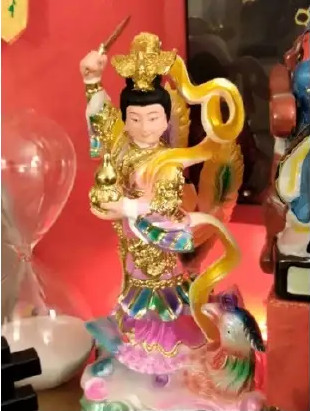
Differences
- A Unique Blend of War and Sexuality
What sets Jiutian Xuannu apart from many goddesses is her unusual combination of martial prowess and expertise in sexual energy cultivation. While many goddesses are either associated with war or with fertility/sexuality, Jiutian Xuannu uniquely spans both realms. This makes her a rare figure in mythology who embodies both yin and yang in a way that few other deities do.
For example, while Athena is a goddess of war and wisdom, she is distinctly celibate, representing a more intellectual, non-sexual form of power. Conversely, fertility goddesses like Aphrodite (Greek) or Venus (Roman) are tied closely to love and sensuality but are not generally depicted as warriors. Jiutian Xuannu bridges these realms, offering guidance in both martial and sexual matters, showing a comprehensive understanding of power that is both physical and spiritual.
- Focus on Longevity and Internal Alchemy
Another distinguishing feature of Jiutian Xuannu is her deep connection to Taoist practices of internal alchemy and longevity. While many fertility goddesses are associated with physical creation and the renewal of life, Jiutian Xuannu’s teachings go beyond reproduction.
She guides practitioners on how to cultivate sexual energy (jing) to achieve physical health, spiritual balance, and potentially immortality. This focus on internal energy and Taoist spiritual cultivation is unique to Jiutian Xuannu and reflects Taoist views on the transformation of life force into spiritual power.
In contrast, goddesses like Demeter from Greek mythology, who governs harvest and fertility, focus on the cyclical nature of life and death, with an emphasis on the external world. Jiutian Xuannu’s concern with internal energy and the transformation of the self sets her apart from such deities, who typically govern natural cycles rather than personal spiritual growth.
- Role in Military Strategy
Jiutian Xuannu’s role as a divine military strategist who directly intervenes in human warfare also differentiates her from many other deities. While several goddesses inspire warriors or protect cities (such as Athena or Durga), Jiutian Xuannu is known for providing detailed, tactical guidance to the Yellow Emperor, teaching him how to defeat the warlord Chi You.
Her direct involvement in shaping the outcome of historical battles gives her a unique place in Chinese mythology, emphasizing her role not just as a warrior but as a divine tactician.
Other warrior goddesses may inspire or lead from a distance, but Jiutian Xuannu’s specific involvement in military affairs, including the introduction of weapons and strategies, is more hands-on and rooted in real historical myths. This active participation makes her not only a symbolic figure of strength but also a practical influence on warfare and governance in ancient China.
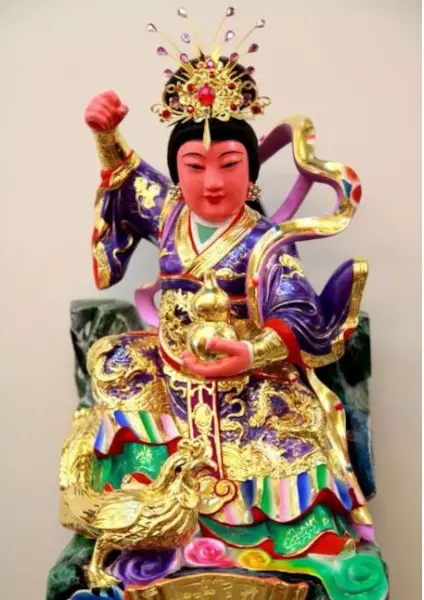
Jiutian Xuannu in Feng Shui
In addition to her powerful role in mythology and Taoism, Jiutian Xuannu also holds a special place in the practice of feng shui. As the Goddess of the Nine Heavens, Jiutian Xuannu embodies cosmic balance and protection, making her a revered figure for those seeking to enhance their environment’s positive energy and ward off negativity.
Her dual nature as a warrior goddess and a symbol of femininity makes her an important figure for those seeking to harmonize their living spaces with both strength and nurturing qualities. Practitioners may invoke her influence to enhance the protective aspects of their environments, particularly in spaces where strategic thinking and decision-making take place, such as offices or study areas.
Placement and Representation
To harness Jiutian Xuannu’s energies in Feng Shui, her representations—such as statues or images—are typically placed in the northwest area of a home or office. This direction is associated with helpful people and mentors, aligning with her role as a guide and protector. By placing her figure in this sector, individuals can invite her wisdom into their lives, fostering an environment conducive to strategic planning and successful outcomes.
Enhancing Protection
Jiutian Xuannu’s powers of concealment and protection are particularly relevant in Feng Shui practices aimed at warding off negative energies. Her association with invisibility can be symbolically represented through mirrors or reflective surfaces placed strategically around the home. These elements can serve to deflect harmful influences, echoing Jiutian Xuannu’s ability to shield her followers from both physical and spiritual threats.
Balancing Yin and Yang
Jiutian Xuannu embodies the Taoist principle of balance between yin and yang, and this makes her a useful figure in feng shui practices designed to harmonize opposing energies. In feng shui, achieving a balance between yin (passive, dark, and feminine energy) and yang (active, bright, and masculine energy) is crucial for creating a harmonious and prosperous environment.
As a goddess who effortlessly moves between the realms of war and sexuality, strength and compassion, Jiutian Xuannu represents this duality, making her an ideal symbol for balancing the energies of a space.
In homes or offices where energy imbalances may exist—such as areas that feel either too stagnant (yin) or too chaotic (yang)—Jiutian Xuannu can be invoked to restore equilibrium. Her presence in the form of artwork or altars can help regulate the flow of qi, ensuring that neither yin nor yang dominates, but instead, both work together to create a peaceful and productive atmosphere.
Want to learn more about Feng Shui? Take a look at these Courses and Books – Aff.link
Lessons and Teachings from Jiutian Xuannu
The myths surrounding Jiutian Xuannu convey several moral lessons that resonate with both historical and contemporary audiences. One key lesson is the value of courage in adversity. Jiutian Xuannu’s unwavering support for Huangdi illustrates the importance of seeking guidance and wisdom in times of crisis.
Additionally, her character embodies the principle of using one’s abilities for the greater good, encouraging followers to act with integrity and compassion while wielding power.
Another central theme in Jiutian Xuannu’s teachings is the balance between power and compassion. While she is a fierce warrior goddess, her actions are often guided by a desire to protect and nurture those who cannot defend themselves. This duality reflects a broader philosophical principle found in Taoism—the idea that true strength comes from understanding when to act decisively and when to exercise restraint.
Jiutian Xuannu teaches that power should be wielded responsibly, emphasizing that leadership involves not only commanding respect but also showing compassion. This balance is essential for fostering harmony within communities and ensuring that power is used for benevolent purposes rather than personal gain.
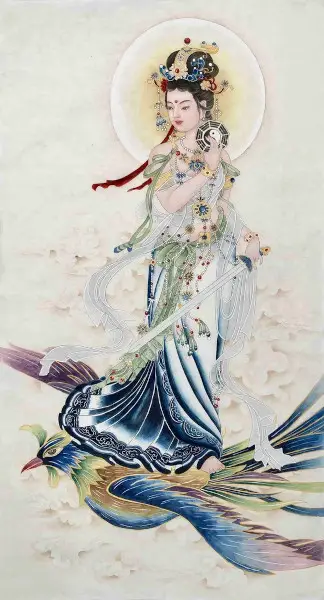
Final Thoughts
Jiutian Xuannu, the Goddess of the Nine Heavens, stands as a powerful symbol in Chinese mythology, embodying the intricate interplay between war, sexuality, and wisdom. Her multifaceted character has inspired countless generations, offering valuable lessons in strategy, resilience, and the balance of power and compassion.
Through her role as a divine strategist and mentor to historical figures like the Yellow Emperor, Jiutian Xuannu emphasizes the importance of intelligence and moral integrity in leadership. Her teachings resonate deeply within the realms of Traditional Chinese Medicine and martial arts, reflecting her influence on health, longevity, and personal cultivation.
As a guardian of sexuality, she challenges societal norms while celebrating feminine power, reminding us that true strength encompasses both fierce determination and nurturing compassion. The ongoing worship of Jiutian Xuannu in modern times underscores her enduring relevance as a figure who inspires individuals to harness their inner strength while remaining connected to their values.
In a world that often grapples with the complexities of gender roles and power dynamics, Jiutian Xuannu’s legacy serves as a beacon of hope and empowerment. Her stories continue to inspire discussions about feminine divinity and the vital balance between strength and empathy—an enduring testament to her significance in both ancient and contemporary contexts.
Related reading: Caishen – The Chinese God of Wealth and His Role in Chinese Culture and Feng Shui– Opens in new tab
Stay in Touch
 Join our newsletter by using the forms on this website or click here!
Join our newsletter by using the forms on this website or click here! Follow us on Google News
Follow us on Google News Follow us on Facebook
Follow us on Facebook

